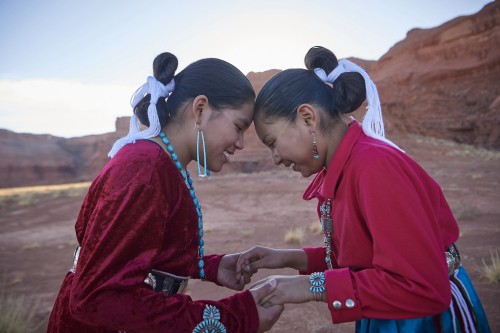
(+)Connection is Medicine (Navajo Nation study name; +CiM) / The Healing Spirits Program (White Mountain Apache Tribe Study Name; HSP) is aimed at supporting Diné and Apache families who are struggling with mental health due to ongoing stressors related to the COVID-19 pandemic and returning to in-person learning. The study will leverage evidence-based tools, including developing individualized based coping plans and facilitating connections to care through case management. Selected participants from the study will also receive regular text messages, or postcards, that offer encouragement, stress coping strategies, and contact information to community supports (e.g., tribal behavioral health agency, National Suicide Hotline, etc.).
As part of the intervention, weekly messages of care, support, and connection will be sent to an individual over the course of three months. The developing of coping plans and the messaging interventions are simple, evidence-based tools, that are proven to address the mental health concerns of caregivers and youth identified through the Project SafeSchools study that has been completed March 2023 on the Navajo Nation and Fort Apache Indian Reservation.
Study Activities
With guidance from Community Advisory Boards and school partners, the following activities will take place:
- Adapt a safety planning intervention to address promotion of coping skills among caregivers and youth with elevated symptoms of mental health distress;
- Develop a series of culturally responsive and trauma-informed text message scripts and post cards with messages of care, support, and community support connection;
- Utilize the Project SafeSchools safety response protocol to identify and recruit youth and caregiver participants who had high risk alerts on mental health assessments;
- Deliver the coping plan intervention to all +CIM/HSP pilot participants;
- Deliver the caring messages over the course of three months to those enrolled in this part of the study;
- Conduct pre- and post-intervention assessments to track response to the interventions;
Provide other implementation support as needed.
If you would like to learn more about the original Project SafeSchools study, click here.
To learn more about the development and purpose of the Safety Planning Tool, visit:
The Bureau of Indian Education is increasing behavioral health and wellness support by launching a 24/7 support line for students and staff at schools and programs funded by the bureau. Students and staff who call 1-844-ASK-BHWP (1-844-275-2497), will be connected with trained professionals who can provide immediate individual attention. The call line offers 24/7 crisis support and scheduled counseling sessions.
Funded by the National Institutes of Health (NIH)